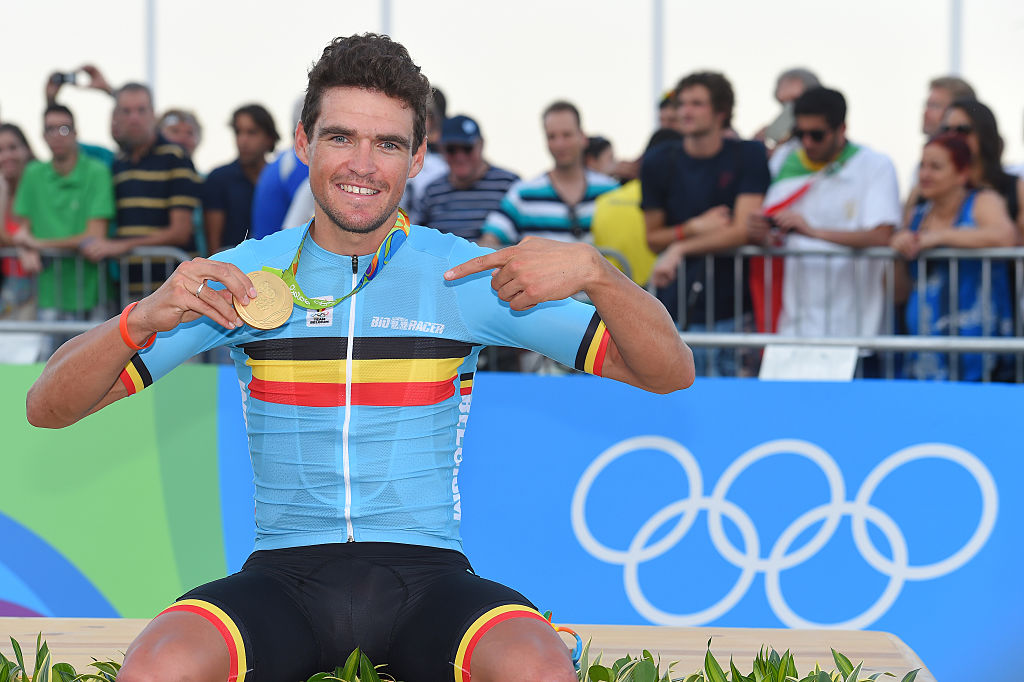Quarantine and vaccines not needed to compete at Tokyo Olympics
IOC Playbook suggests a Tour de France-Tokyo double is possible

Athletes travelling to Japan for the Tokyo Olympic Games won’t need to quarantine for 14 days on arrival as was initially feared, with the International Olympic Committee athlete playbook saying athletes will only need to confirm a negative COVID-19 PCR test 72-hours before flying to ensure they can compete.
This means riders can finish the Tour de France in Paris and then travel to Tokyo for the men’s road race event which is scheduled just six days later on Saturday, July 24. This means Tadej Pogačar, Primož Roglič, Geraint Thomas, Greg Van Avermaet and Wout van Aert can all fully focus on the Tour de France before travelling to Tokyo to fight for gold.
Athletes in other disciplines can also avoid worry, with the women not having to quarantine after racing the Giro Rosa that ends on July 11.
Concerns about a conflict between the Tour de France and the Olympics emerged after the Games were postponed in 2020, with the planned Grand Depart hosts Copenhagen, Denmark unable to move the Tour dates to avoid an overlap. The organisers then moved the start to Brittany and shifted the date one week earlier, giving Copenhagen the Grand Depart in 2022.
The coronavirus continued to cause havoc for sports, as tennis players faced two weeks of quarantine after arriving in Australia for the Australian Open this year but Toshirō Mutō, the head of the Tokyo organising committee played down the need for Olympic athletes to follow similar strict measures.
The IOC has published a series of Playbooks in recent days as it fights to keep the Olympic Games on track. The athlete’s Playbook does not mention a quarantine period in Japan, instead it athletes will have to provide a negative COVID-19 test result within the 72 hours before traveling to Japan.
They will also have to use a health reporting smartphone app during the 14 days before they travel, logging their daily body temperature and any possible COVID-19 symptoms. The data will be shared with Japanese authorities.
Get The Leadout Newsletter
The latest race content, interviews, features, reviews and expert buying guides, direct to your inbox!
Athletes will also have to register their travel, accommodation and planned activities for the first 14 days in Japan. This is likely to include where they will train and whoever they expect to have close contact with during their stay such as teammates and team staff.
The Playbook recommends good hygiene such as regular hand washing, using hand sanitiser and wearing a face mask. It also warns against unnecessary forms of physical contact such as hugs, high-fives and handshakes, suggesting athletes keep two metres apart during meals and keep contacts to a minimum. Athletes are told to stay at the official Olympic venues and accommodation and told not to use public transport, visit gyms, tourist areas, shops, restaurants or bars.
Athletes will have their temperature checked before entering the Olympics with those showing a 27.5°C temperature not permitted to enter the venues.
Anyone who comes into close contact with a confirmed COVID-19 case will have to undergo testing and will be held in a designated area until the result of the test is known. Anyone with COVID-19 symptoms will be taken to a COVID-19 outpatient clinic to undergo testing and cannot compete until given the all-clear.
It explained that Anti-doping testing will operate in accordance with health and safety measures and WADA guidelines.
“Your compliance with such rules and instructions is key to successfully achieve our common objective to ensure that the health of all the participants to the Olympic and Paralympic Games is protected and that the Games are safely staged,” the Playbook warns.
“Non-respect of the rules contained in this Playbook may expose you to consequences that may have an impact on your participation to the Olympic and Paralympic Games, your access to Games venues and, in some cases, on your participation to competitions.”
No priority for athlete vaccines
There has been much debate about if Olympic athletes should be given a COVID-19 vaccine to protect them and the Tokyo Games.
The IOC playbook does not call for athletes to be given priority but calls on them to be vaccinated if possible.
“When vaccinations are made available to a broader public... given their role as ambassadors of their NOCs and NPCs given the role of sport 'to promote safe sport as a contributor to the health and wellbeing of individuals and communities.'”
The Playbook concludes with a clear message on vaccines and COVID-19 rules for the Tokyo Olympics.
“You will not be required to have received a vaccine in order to participate in the Games – and all of the rules outlined in this Playbook will apply, whether or not you have received the vaccine,” the document concludes.

Stephen is one of the most experienced member of the Cyclingnews team, having reported on professional cycling since 1994. He has been Head of News at Cyclingnews since 2022, before which he held the position of European editor since 2012 and previously worked for Reuters, Shift Active Media, and CyclingWeekly, among other publications.